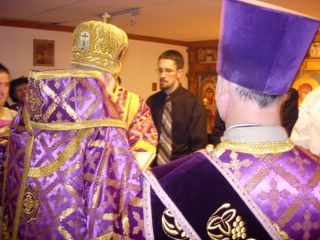Saturday, December 31, 2005
The Psalms of David -- Psalm 21
Most notable are the exact descriptions of the crucifixion within this psalm, seen in vv. 7-8 (cf. Matt. 27:39-43), v. 15 (cf. Jn. 19:28) and v. 18 (cf. Jn. 19:23-4).
Fr. Patrick draws our attention to the quotation of this psalm found in the second chapter of the epistle to the Hebrews, where the Passion is given its proper context of "the Lord's sharing our flesh and blood so that 'through death He might destroy him who had the power of death' (2:14). Quoting Psalm 21 in this context of the Passion, the author tells us that Jesus 'is not ashamed to call them brethren, saying, "I will declare Your name to my brethren; / In the midst of the assembly I will sing praise to You"' (2:11,12)."
Appropriate that this psalm ends in the same manner as did our Lord's predictions of His crucifixion: with the victory of His Resurrection (cf. Mk. 8:31; 9:31; 10:34). "My spirit lives for Him; my seed will serve Him," the psalm declares. "The coming generation shall be herald for the Lord, declaring His righteousness to a people yet unborn, whom the Lord created."
The Psalms of David -- Psalm 20
The first thing, of course, that jumped out at this married man was the fact that this is the prokeimenon sung at weddings before the reading of the epistle. It's usually mentioned by the priest in every homily I've ever heard at Orthodox weddings (my own included), and it's interesting to consider what it means to a married couple and to then compare it to what it means when this psalm is taken in a christological sense. Those crowns they put on our heads (see My Big Fat Greek Wedding for an example of the crowns if you've never seen an Orthodox wedding...though that wedding left much to be desired from an Orthodox standpoint, but I digress!) are seen to be crowns of martyrdom, both in submitting to each other and laying down our lives one for another, but also in the sense that we are to assist each other in our salvation, a life of "white martyrdom" that revolves around presenting our bodies as living sacrifices to God (Romans 12:1) together, and urging each other on to further good works.
Taken in the sense that this psalm speaks of Christ, however, this verse refers to His crown, not of thorns, but of "pure gold" (the common translation in our prokeimenon is "of precious stones"), speaking not of His Passion on the Cross, but of His glorious Resurrection and victory over death. "By reason of His Resurrection," says Fr. Patrick, "Jesus reigns as King.... And because He is King, He is crowned." The phrase that follows His coronation, then--"He asked life of You"--what sort of life did Christ ask of the Father while enduring His Passion? "The mere survival of His earthly body?" Fr. Patrick asks. "Hardly. The object of Jesus' prayer was, rather, the total life that stands forever victorious over death, the irruption of the divine life into the world by reason of His own passage through death to glory." How fitting, then, that spouses should look to each other--the ones to whom we have been crowned in anticipation, even before the struggle's end--as the ones with whom we can journey through this life, side by side, enduring together in a passion of our own--one that has little, if anything, to do with what this world defines as "marital passion"--so that they may "finally, by [God's] mercy, [be accounted] worthy of everlasting life"--the life asked for and obtained by Christ on our behalf--and that, through union with Him, we might share in the true reality of the crowns we wore and for which we now strive.
Friday, December 30, 2005
The Psalms of David -- Psalm 19
I'll just offer an outline of Fr. Patrick's dissection of this matins psalm in the Orthodox Church:
- This psalm is a prayer of the Church to Christ Himself, an "Amen to the redemptive work of Christ."
- "...the line that reads, 'All your sacrifices'...is the 'Amen' of the Church to the pouring out of the redemptive blood..."
- "When we say, 'May He give you according to your heart's desire'...it is once again the 'Amen' of the Church to the prayer Christ makes for her benefit" (Jn. 17:20-4).
- "When we say, 'May the LORD fulfill all your requests,' it is especially the 'Amen' of the Church to such petitions as (Luke 23:34; Jn. 17:11).
- "When we say to Him, 'We shall exult in Your salvation'...thus does she (the Church) exult... (Rev. 5:9-10, 12)."
- When the Prophet David (as well as Isaiah--31:1; 36:9) says that "some trust in chariots, and some in horses," Fr. Patrick notes that "Holy Scripture wil finally describe these horses as white and carrying a conqueror, as red and bearing a warrior, as black and transporting famine, as pale and ridden by Death" in an ultimate betrayal of those who put their trust in anyone other than God.
- While our psalm states, in agreement with Heb. 7:25 and 9:12, that "Now I know that the LORD has saved His Christ," it also confesses, along with 1 Jn. 3:2, that "We shall be magnified" ultimately at some point in the future.
Thursday, December 29, 2005
The Psalms of David -- Psalm 18
"The Christian faith," Fr. Patrick begins, "recognizes two ways in which God has made His revelation to us: through nature and through grace. 'Through Creation and through Scripture' is another way of saying the same thing." In a well-known verse in this psalm, sung often in the Divine Liturgy of Orthodox services (the prokeimenon before the epistle and in other places) the Prophet David states, referring to all the wonders of nature, that "Their sound has gone out through all the earth, And their words to the end of the world" in declaring the glory of God (vs. 4).
St. Paul takes up this line in the New Testament, saying that the missionaries who take the message of the gospel out to those who do not know Christ are working, as it were, hand in hand with nature. He asks the believers in Rome, "have they [the people of the world] not heard? Yes indeed: 'Their sound has gone out to all the earth, and their words to the ends of the world'" (10:8). "Paul is saying," notes Fr. Patrick, "that the Gospel is as cosmic as the cosmos."
This is one aspect of God's revelation of Himself--as well as our part in that revealing of Him to our fellow man--that has always fascinated me, as well as put me at odds with many (though by no means all) Evangelicals when I was in that camp. It's been refreshing to come into a confession of Christianity which strongly affirms our link with the rest of creation, sentient as we humans are, or not. The universe, though groaning as in the pains of childbirth and waiting for Christ, Who is our Life, to appear and complete our adoption as sons and our (as well as its own) full redemption (Rom. 8:21-23; Col. 3:4), yet does a more faithful job of declaring steadfastly that there is a God, that He sends down rain on the just and the unjust, that He is a creative Creator and that He provides for us, in cycles of death and resurrection, a witness of His plan to sustain us and help us grow. We, the supposed crown jewel of Creation (we are; the "supposed" comes from our lack of living up to our potential), sputter and stall in our inconsistent efforts to praise Him and make Him known. Our glory--that we are made in the image and likeness of God--has been the source of our greater fall; would that we could observe the glory of God made manifest through our fellow creations and become worthier icons ourselves. Lord, have mercy.
The Psalms of David -- Psalm 17
This psalm, says Fr. Patrick, is best seen in the context of Christ's trial before Pilate. Most important to remember, however, is that in verses like vv. 37-42--
"37 I have pursued my enemies and overtaken them; Neither did I turn back again till they were destroyed.
38 I have wounded them, So that they could not rise; They have fallen under my feet.
39 For You have armed me with strength for the battle; You have subdued under me those who rose up against me.
40 You have also given me the necks of my enemies, So that I destroyed those who hated me.
41 They cried out, but there was none to save; Even to the LORD, but He did not answer them.
42 Then I beat them as fine as the dust before the wind; I cast them out like dirt in the streets."
--we must remind ourselves of who "the real villians in this psalm" are: "the satanic spirits, the true enemies who consipred against the Holy and Righteous One. Consequently, it is the fallen angels that we should see referenced in so many lines of this psalm" instead of the Jews or the Romans, "for against them [the spirits] our Lord waged a combat without quarter."
Wednesday, December 28, 2005
The Past Few Days and Weeks
MUCH travel the past week or so; drove out here from Ft. Worth (15 hours, thankyouverymuch) on the 22nd after school let out (Audra and Hope had flown out the Sat. before). Uneventful, except for two things...in order to make the trip in one day, I had to leave CRAZY early in the morning, and this meant much fog...it's interesting to watch the low-lying, rolling fog go over people's crops; it almost looks as if they're growing fog. The other event--not so picturesque--were the two traffic snarls which literally stopped traffic. Fortunately, I called my navigator in KY, who hopped online and, over the cell phone, found me a way around them. Made the trip in good time regardless, thanks be to God. Will drive back on the 2nd, stopping to meet with a friend in Nashville for lunch. The girls will fly back the following day. Your prayers would be appreciated.
More driving to see father-in-law's fam in Hopkinsville, and mom-in-law's fam in Sturgis. Easy conversation; very warm people. Good to see them again, even some new faces. Very welcoming. Spent Christmas Day morning in the Cumberland Presbyterian Church there in Sturgis--not Orthodox, of course, but at least none of this "let's-close-because-it's-Christmas-Day-and-people-should-be-with-their-families-instead-of-in-church" nonsense (yes, people should be with their families, but let's remember where our true family, is, ¿no?).
Speaking of true family, confession before leaving for Kentucky was, as far as I could perceive, a very reflective, honest (and relatively long) one. While my own heart's estimation may not do justice to the reality of my heart's state (for God's knowledge of me is greater than even my heart's--1 Jn. 3:20), it did, at least, pave the way for a much more attentive vespers service that night. God be praised for His forgiveness and for His help in overcoming our weaknesses. Will commune at St. Michael Orthodox Church in Louisville on Sunday, Lord willing. Always good to connect with brethren around the country.
Other things...the new church building is almost ready to be moved into! Pictures of the blessing by the archbishop will be forthcoming (once I get back to FW, Lord willing), as well as of the consecration shortly after (whenever THAT is). Much excitement over this new chapter in our life as a parish family; may God grant us increase as we make room for more souls to come into His true Church, to share in His true Banquet.
Hope is sitting up on her own and eating strained solid foods! What a mujercita! She, of course, is the darling of every house we take her to; not only is she getting spoiled by all the attention and people carrying her around, but we as her parents are getting spoiled by having so many live-in, on-call, free babysitters! 'Twill be a rude awakening for all parties involved when we return to normal, Ft. Worth life and all the work involved. If we can pry her away from the grandparents, that is....
It is amazing, though, to have Hope as a living, breathing, wriggling example of what our Lord looked like as an infant. To think: our Creator, the One Who spoke worlds that before were not, Who holds the whole universe in the hollow of His hand, became one of these chubby, squealing, grinning little wonders--helpless, humanly speaking, and sucking at His holy mother's breast. In that one act, our God provided for our nature, for our race, a way out of its destiny of decay and thus moved all of human nature from enmity to friendship ("compatibility," as my much-more-computer-savvy friend would say) with God. What was once impossible (the renewal of our nature and the salvation of our individual souls), regardless of how much we obeyed, has now been made possible by a cooing, peaceful, and gloriously divine infant resting in a cave, born of a spotless virgin, given flesh and blood in order to be the firstfruits of our salvation, flesh and blood of which we would all partake, for the forgiveness of our sins, and the healing of our souls and bodies.
As always, grateful for the chance to deny myself for forty days--learning through both the times when I succeed in this and when I fail--and thus to remind myself that He is the One thing needful in my life. Would that we would remember Him thus always.
Tuesday, December 27, 2005
Christ is born! Glorify Him!
Troparion - Tone 4
Your
Nativity, O Christ our God,
Has shone to the world the Light of wisdom!
For by it, those who worshipped the stars,
Were taught by a Star to
adore You,
The Sun of Righteousness,
And to know You, the Orient from on
High.
O Lord, glory to You!
Kontakion - Tone 3
Today the
Virgin gives birth to the Transcendent One,
And the earth offers a cave to
the Unapproachable One!
Angels with shepherds glorify Him!
The wise men
journey with a star!
Since for our sake the Eternal God was born as a Little
Child!
Sunday, December 04, 2005
Tonsured
For those of you who've followed this blog for a while know that Peter was my name in the Church. I "took" the name David today when I was tonsured a reader, for several reasons. One, my given first name is David, so tradition would dictate that I would "baptize" the name I've always had. I was planning on being chrismated as David, but my then-priest recommended that I consider Peter, which I did, for various reasons that had to do with my first confession and with certain hurdles I had upon coming into the Church which were overcome by meditating on certain events in St. Peter's life. So, for that time, St. Peter was a wonderful companion, and his icons will remain in our house always, but it seems time to "get back to my roots" and reclaim the name I've always had. Plus. the Prophet David is commemorated on the Sunday following Nativity, which is on or around my birthday, Dec. 27th. As I had a very difficult and premature birth, it seems to fit that he'd be looking out for me. Plus...reader of psalms, named after the writer of psalms who was said to be a man after God's own heart...it was just time, I thought.
Plus..."the reeder Peeder"...come on, now... ::wink::
Enjoy the photos; see you after the Feast of Nativity!
Wednesday, November 16, 2005
A Break from the Blogosphere
...I'll be taking a break from the blog for the next forty days, as today began the Orthodox Nativity Fast (for those of us on the New Calendar, at least). This is usually my custom during both the "Lents" of the year, so expect the same thing in the Spring.
I will, though, be breaking said fast once and only once (Lord helping me) to post pictures of the tonsuring mentioned in the previous post.
I wish you all a blessed Advent/Nativity season. May our Incarnate Lord have mercy on us all.
Sunday, November 13, 2005
December 4th
Your prayers for Daniel, Demetrios, and Peter would be appreciated.
(And before anyone says it: yes, I am aware that, after that point, upon approaching the Chalice I will be referred to as "The Reader Peter," which sounds like "the Reeder Peeder." Hardy har. Eh...keeps ya' humble...)
Tuesday, November 08, 2005
Suffering Towards Stillness
Apathy is defined as a "lack of feeling or emotion" or a "lack of interest or concern." Understandable, then, are the raised eyebrows that respond to one who is said to be "striving for apatheia." The Greek word, however, is very different, for it calls us not to turtle-shell, shoe-staring introspection, not to reclusion from the world--though some have felt the call to flee for the sake of their own souls--but rather to a steadfastness, an immovablity within a person. This hearkens back to the likes of St. Ireneaus and his contemporaries, who said that the immutablity of God is one of His greatest, most lauded qualities--for in it lies His utter dependability and changelessness--and it is also one for which Christians should strive most diligently.
Again, I speak not of indifference to others' lives and sorrows, but to our own selves, our so-called "rights," our runaway-train impulses. When insulted, we bear no malice, desire no revenge. When tempted, we feel no pull, no conflict. Apatheia, then, is not a matter of simply "doing the right thing and not doing the wrong thing," but rather a matter of having our very nature tranformed--or, better yet, transfigured--so that we are healed from being vulnerable to these weaknesses. We stand strong and still because God has made us so.
This, however, requires effort, an effort of the heart and mind--for our natural tendency is not to act from within, but simply to react to stimuli from without--and we truly do have little, in and of ourselves, that is capable of moving in the sovereign freedom of God that St. Gregory of Nyssa talked about.
Funny thing, though: the Christian perfection that we are called to--to the point where, as I said earlier, "when tempted, we feel no pull, no conflict"--is not arrived at easily or soon, or, for most, at all in this life. St. Antony, the father of monasticism himself, has said that we are to expect temptation to our last breath. There is no "absolute zero" of the soul, as it were, no total stillness to be found--rather, when one ceases to give oneself "over to every evil desire [and be] a slave to passion" in a certain area (when one has borne his or her cross and successfully died to passion X, in other words)--one can consider himself healed, but healed only to bear more crosses. This suffering towards stillness--and it can only be this way, for in the Cross' humility Christ finds glory and secures our race's salvation--is what St. Paul means when he says that "we all, with unveiled face, beholding as in a mirror the glory of the Lord, are being transformed into the same image from glory to glory, just as by the Spirit of the Lord" (2 Cor. 3:18).
May we all "stand still, and see the salvation of the LORD" (Ex. 14:13).
Monday, November 07, 2005
5th Line of 23rd Post
The 5th line of my 23rd post is the following:
"The last sentence gave me pause: 'But don't despair: science has proven that "Happy Couplehood" has only a six-month duration (a year, tops), so they'll be immersed in the unpleasantness of everyday existence soon enough, just like the rest of us.'"Read here for the context. Thanks, Mimi. All you other veteran bloggers, let's hear it!
Monday, October 31, 2005
Hope Halloween Photos!
Friday, October 28, 2005
Tuesday, October 25, 2005
Thoughts about Languages
I began studying Spanish in the seventh grade. Dad (as well as Sesame Street) had given my little sponge brain a nice little primer (numbers, basic greetings, feelings, etc) growing up, and I took to the subject eagerly and naturally OK, I'll be honest: I was and am, academically speaking, a dork in that I LOVE the hallowed halls of academia, so taking to the subject naturally wasn't too much of a surprise, if I can say that without sounding too arrogant...**grimaces**...what DID surprise me was how much I LOVED the subject itself! Math, science, even English--I loved the fact that I could succeed in these courses with little effort, but Spanish...I just LOVED learning it for its own sake. And I learned the traditional way--textbook vocabulary lists, grammar exercises, workbook listening and speaking exercises, etc.--with an almost innate ability to take the grammar rules I'd learned and put them to use in real-life situations.
So I go to college, double major in English Ed and Spanish, and wind up teaching Spanish in a non-magnet school environment (my high school environment was accelerated, AP-type stuff), and, sho nuf, I taught they way I was taught: worksheets, verb conjugation charts, etc. At the end of the year, though, something was odd: my students could conjugate the heck out of a verb or two, meaning that they knew grammar rules, but they didn't know Spanish; if someone came up to them and asked them ¿Qué hora es? they'd be stuck. So I investigated TPR--Total Physical Response--and it claimed to address this very problem. I read a couple of books on it over a summer, and implemented the stuff I gleaned from it the following year.
It was (and is) amazing. My students, in terms of actual communication, can do more after three months of instruction in TPR than my kids in traditional schooling could do after a whole YEAR of instruction. Rather than focus on grammar, we take phrases (already conjugated somehow) and assign an action to them, and every time I say the phrase, they do the action until the sound of the word triggers the meaning. Then, we put the words (along with the words they've already acquired) into a story (which they make up, mostly) and they can oftentimes retell the story with relative ease. They even write their own stories--over 100 words in nine minutes at this point for many of them--and we have quite a bit more fun than I remember having in my own, traditional Spanish class (aside from the dorky, "Wow-this-is-nifty-'cause-I'm-learning!!!" fun, that is).
So why the comparison? Well, like anybody who naturally achieves at something, I find myself feeling as though I'm depriving my kids. TPRS (the S being for Storytelling) doesn't stress formal grammar, correct conjugation, etc) like traditional learning, so it's hard for me not to cringe when I hear my kids say something like, ¡Mi necesitaba fue baño, Señor! (a horrible version of "I need to go to the bathroom, sir!") It's made me realize exactly what it is that I do when I take all those grammar rules and run them through my head real quick-like to communicate in higher-level Spanish: it's like doing calculus in one's head. On the one hand, I know there are bright kids who can handle the grammar, who can use the grammar (as well as the extensive vocab units) and go onto AP stuff. But the majority of these kids...man...this is just getting them to do basic (read: ROUGH) communication in Spanish; the use of the more intricate grammatical functions is and most likely will be lost on them.
So it's a matter, imo, of doing the most I can for as many as I can, and trusting that the ones who will go on and succeed are not going to be killed by going more slowly than I'd like (the premise of TPRS being "Teach less...but teach it more") and that, if they want to continue in this they'll catch the vocab later. It's difficult being someone who got all the vocab words and irregular verbs the first time he heard them; Lord grant that I would act wisely, without embittering or embarrassing those who do not have the gift You've given me.
Lord, have mercy. Lord, have mercy. Lord, have mercy! And blessed be the name of the LORD.
Sunday, October 23, 2005
Just in Case You Haven't Read it Yet...
The Church is Visible and One by Patrick Barnes of orthodoxinfo.com reknown, regarding THE issue that (ultimately) converted me.
Fabulous. Rather long, but fabulous.
Child on Loan from God
I suddenly had a "head smack" moment of why we do this godparent thing. Yes, yes, the historical roots of such a practice date back to the days of the Roman persecutions when parents stood a good chance--due to the likelyhood of martyrdom--of never seeing their kids grow up in the Faith, so godparents were assigned to do just that. There is that. But watching the two of them approach the Chalice, approach our God's flesh and blood while we just stood there impressed two things upon me:
1) This child is not really mine. Biologically, yeah. Don't get any ideas. But she's "on loan," as it were. And that meeting at the Chalice is why she's really here. That's Who she really belongs to, so the fact that another should take her there, who's specifically there to be an example in the faith, seems fitting to me.
2) The child went on up ahead of me, which left me free to...pray. For myself. She was fine. She was partaking of the all-holy Body and precious Blood of the Lord, unhindered by any personal sin. I was not, and this needed my attention. For if my own life is unfocused, how can I help her focus hers?
Friday, October 21, 2005
Trinity Explained to Muslims
Part of the text:
Thomas: How do you approach the souls that come to you? If they are Moslem how do you work with them and how do you explain the difference between Christianity and Islam. How do you draw them in?
Fr. Daniel: I think that in any missionary work, you must first of all understand the culture of the people and you have to be able to speak within the bounds of that cultural language, because otherwise your word cannot be heard or understood. So, when you talk with a Moslem, you must understand the Moslem mind. Don’t just try to throw in words and phrases that are familiar to Christians, to Orthodox, because they will not be understood by a Moslem. First of all, when you talk to a Moslem, you have to emphasize that God is One.
Thomas: Because they already believe this?
Fr. Daniel: Not only because they already believe this, but because they accuse us [the Christians] of having three gods. That is the problem. So, you have to clear up the misunderstanding that we worship three gods. Don’t try to use our traditional language, like Father, Son and Holy Spirit – because for them, that is three gods! In their minds, the Father is different, the Son is different, the Holy Spirit is different. For myself, I emphasize that God is One, that this One God is also the Living God, and as the Living God He has Mind. Because if God didn’t have a mind, I’m sorry to say, He would be like an idiot. God has to have a mind. Within the Mind of God there is the Word. Thus, the Word of God is contained within God Himself. So, God in His Word is not two, but one. God is full with His own Word; He is pregnant with Word.
And that Word of God is then revealed to man. The thing that is contained within – like being impregnated within oneself – when it is revealed, it is called being born out of that person. That is why the Word of God is called the Son: He is the Child Who is born from within God, but outside time. So, that is why this One God is called the Father, because He has His own Word Who is born out of Him, and is called the Son. So, Father and Son are not two gods. The Father is One God, the Son is that Word of God. The Moslem believes that God created the world through the Word. So what the Moslem believes in as Word, is what the Christians call the Son! In that way, we can explain to them that God does not have a son separate from Himself.
Thomas: So the Moslems see our idea of the Son of God in terms of physical sonship.
Fr. Daniel: Yes, of course. And God does not have a son in that way, that’s true. He is not begetting in the sense of a human being giving birth. He is called the Father because He produces from Himself, His own Word, and that Word is the Son. So because God is the living God, He must have the principle of life within Himself. In man, this principle of life is man’s spirit. God is the same. The principle of life within God is the Spirit of God. It is called the Holy Spirit. But the Holy Spirit is not the name of the Angel Gabriel, as the Moslems understand it. The Holy Spirit is the living principle, the principle of life and power within God Himself. This One God is called the Father because He produced from Himself His own Word, which is called the Son, and the Word of God is called the Son because He is born out of the Father eternally, without beginning, without end. This One Living God also has Spirit within Himself. So, Father, Son and Holy Spirit is one God. This is the way we explain to Moslems about the Trinity, and we should not try to use our language of “Father and Son, co-equal, co-...” something like that. Even though it is our Christian terminology, they will not understand this. The purpose is not to theologize to them but to explain the reality of the Gospel in a way that is understandable to them. This is point number one: you have to be clear about the Trinity. The second point is this: the basic difference between Islam and Christianity concerns revelation. In Islam, God does not reveal Himself. God only sends down His word. “Revelation” in Islam means “the sending down of the word of God” through the prophets. And that word is then written down and becomes scripture. So in Islam, revelation means the “inscripturization” of the word of God while in Christianity, it is not the same. The Word was sent down to the womb of the Virgin Mary, took flesh and became man. Namely, Jesus Christ.
So, the two religions believe that God communicated Himself to man by means of the Word, but the difference is how that Word manifested in the world. In Christianity it is manifested in the person of Jesus Christ and in Islam it is manifested in the form of a book, the Koran. So, the place of Mohammed in Islam is parallel to the place of the Virgin Mary in Orthodox Christianity. That is why in Islam the Moslems respect Mohammed, not as a god, but as the bearer of revelations. Just as the Orthodox Church respects the Virgin Mary not as a goddess but as the bearer of the Word of God, who gave birth to the Word of God. Incidentally, the two religions both give salutations, to Mohammed for the Moslems and to the Virgin Mary for Christians. The Moslems also have a kind of akathist, like a paraclesis but to Mohammed! It is called the depa abarjanji – in Orthodox terms it would be a “canon” to Mohammed, because he is the bearer of the revelation.
The Psalms of David -- Psalm 16
Arise, O LORD, confront him, cast him down, deliver my life from the wicked with Your sword.Also telling are the last two verses, with all their talk of the unrighteous' belly being filled with its portion in this life, as opposed to the righteous' being satisfied only when he "beholds the form" or "awakes in the likeness" of God. This truly is the struggle I know I face: determining day by day--often minute by minute!--where my satisfaction will come from. Will I find my portion in what is passing away in this world with all its passions, or will I be satisfied only by beholding and becoming like the One who is above it all, who changes and heals it all (myself included, if I let Him)?
Fr. Patrick talks a lot about how St. Peter heard the psalms explained to him by Christ after the resurrection and used them when he preached. St. Peter was an ignorant fisherman when Christ found him, but preached the Messiah from the prayerbook of the Church. Comforting to me, another Peter, who desires to meet the Word through the psalms. Arise, O LORD...
A Hard Week and a Half
Add to this lovely complication--isn't it amazing how living out of someone else's house and having to shuttle stuff back and forth puts a cramp in your life?--the fact that I am one of the lead sponsors of our school's sophomore class and that this past week was homecoming, and you have one tired dude. Had to decorate our hall, which meant a week and a half of staying after school, facilitating student work days, storing and moving materials, and putting it all up (with the help of a VERY dedicated core group of students) last night. Now, this would have been difficult regardless. HOWEVER! We--Trimble Technical High School--share a building with a night school who (of course!) had chosen this week to administer the state's standardized tests and (again, of course!) would be using my room to administer said test after school. So--once again feeling the pain of shuttling materials from one place to another because of an unforseen event (we had not been notified by our administrators that the other school would do this, though they'd known for weeks prior)--we moved all the decorations we'd done down to the other head sponsor (who, of course, is on the first floor while I am on the fourth. Joy).
I am happy to say that, small and inconsequential a victory though it may be, we did, in fact, win the competition for best class hall decorations. Now my life can resume its more-or-less normal pattern.
Just in time for another surprise. Hoo boy.
Friday, October 14, 2005
The Psalms of David -- Psalms 14-15
Psalm 15, then, ties all the commands given to the man who would ascend -- which, by the way, all paint a picture of a man the Fathers say has achieved peace, stillness and immoveable inner silence -- into one particular description (v. 8):
“I have set the LORD always before me: because He is at my right hand I shall not be moved.”
May we set Him before the eyes of our hearts through constant meditation and contemplation of His Name. May we be so still at His side that we resist any of our own, sinful, inner reactions to the cares of the world listed in Psalm 14, and rather that we be moved into action from our stillness only by the holy prodding of the Holy Spirit.
The Psalms of David -- Psalm 13 / 52
An interesting note: the almost identical duplication of this psalm within the psalter shows the result of some overlapping from two different collections that eventually made it into the book and were not “synchronized” to prevent the repetition.
Fr. Patrick seems to think that “there is no God” refers only to the atheist, who is, in Fr.’s opinion, is the ultimate in foolishness, engaging in the ultimate and voluntary denial of the self-evident God. He “cuts some slack” to the idolaters mentioned in Wisdom 13 and Romans 1, as though they were not cut from the same cloth.
I think, though, that we today deal with idolaters of a different stripe: the idol is now secularism, and it is much more damaging, I think, than pure atheism. The latter vehemently set itself up as the overt enemy of God (and thereby tacitly acknowledged Him), causing the adherents of the Faith to resist it (atheism) more passionately. Secularism, however, says “there is no God” in a much more devious way, I think. Secularism desires to destroy the transcendent One, to say that nothing can surpass the physical world, that nothing is greater than what our senses can show us, and that (and here’s the horrid part), while God may be found, He is not to be seen as above or beyond -- and certainly not as ruling over! -- the physical world. Therefore, by saying that God is not over something, the secularist, while leaving room for the existence of a deity, is, in his idolatry of the material, denying that this deity is a transcendent One -- and yet we know that if God is not God over all, He ceases to be God at all. A more devious thing, therefore, is not merely to say “There is no God,” but rather “there is no God as He Himself proclaims Himself to be, for the latter, though it allows for the presence in our mind of a deity of sorts, makes it a powerless one, one who will not interfere, one who will not break into our tiny, material worlds and shatter our created souls with His fiery Grace.
May we see You as You are; burn away our foolish hearts, O LORD…
The Psalms of David -- Psalm 12
“How Long, O LORD?”
Some beautifully crafted thoughts on this from Fr. Patrick:
“Psalm 12 yields yet a more ample understanding if we hear it on the lips of the Lord Jesus during the night of His agony and betrayal…As it was in the garden that we first fell beneath the power of darkness, entirely proper it was that the redeeming blood of our true Adam
should fall first on the earth of the orchard, in the shadows of the garden trees, those dear and lovely trees, of whose fruit, He told us, we might freely eat. His blood puddle on the very ground where we contemned His gracious trees, and where the earth had been cursed, and where the ancient serpent was condemned to crawl across it on his belly…Every night has something about it of Gethsemane and the dark salvific drama that unfolded amidst the witnessing trees.
“That nocturnal engagement of Jesus in the garden is repeated, too, in the souls of those He has reconciled to God, for they also are summoned to the bearing of His cross, warring against the devil, sin, and death.”
The Psalms of David -- Psalm 11
Vv. 3-4: “May the LORD cut off all flattering lips, and the tongue that speaks proud things, Who have said, ‘With our tongue we will prevail; our lips are our own; who is lord over us?’”
Fr. Patrick makes the claim in his commentary on this psalm that it is an example of the way Scripture goes against the idea prevalent in today’s society that “[h]uman society, no matter how sinful and deceived, is named the final authority over speech, which is responsible only to those who use it…” He makes the claim based on the idea that man can arbitrarily decide what words mean without regard for the objective truth of God, which was the original purpose of man’s use of speech (cf. Adam’s naming of the animals).
A good idea, I think, but a bit too general…the nature of the defining of individual words is in fact societal and arbitrary; the framing of our thoughts depends on a common societal agreement regarding the meaning of the individual words strung together to express said thoughts. But individual words’ definitions determine neither the capacity nor the tendency of a society to reflect God’s truth either accurately or poorly. Any rendering of individual words is capable of either reflecting or refuting God’s truth; it is the realization of this capability -- transcending as it does the mere use of individual words’ definitions – that determines either the godly or corrupt heart of a people.
Sunday, October 09, 2005
The Psalms of David -- Psalm 10
The LORD is in His holy temple /
The LORD’s throne is in heaven.
"God's throne is the source of our stability and the foundation of our hope," says Fr. Patrick of this psalm. "If there is any firmness for our lives, any steadfastness for our souls, the cause of such constancy is the immoveable throne of Christ our God. Consequently, in the history of Christian prayer this line has often served as the interpretive antiphon for Psalm 10, especially on the Feast of Our Lord's Ascension."
Saturday, October 08, 2005
The Psalms of David -- Psalm 9
The triumph of the risen Christ, as expressed to His Father!
Remembering our place as "dust in the wind," or mere dust that the breath of life has animated:3 When my enemies turn back,
They shall fall and perish at Your presence.
4 For You have maintained my right and my cause;
You sat on the throne judging in righteousness.
5 You have rebuked the nations,
You have destroyed the wicked;
You have blotted out their name forever and ever.
6 O enemy, destructions are finished forever!
And you have destroyed cities;
Even their memory has perished.
7 But the LORD shall endure forever;
He has prepared His throne for judgment.
8 He shall judge the world in righteousness,
And He shall administer judgment for the peoples in uprightness.
9 The LORD also will be a refuge for the oppressed,
A refuge in times of trouble.
10 And those who know Your name will put their trust in You;
For You, LORD, have not forsaken those who seek You.
11 Sing praises to the LORD, who dwells in Zion!
Declare His deeds among the people.
12 When He avenges blood, He remembers them;
He does not forget the cry of the humble.
13 Have mercy on me, O LORD!
Consider my trouble from those who hate me,
You who lift me up from the gates of death,
14 That I may tell of all Your praise
In the gates of the daughter of Zion.
I will rejoice in Your salvation.
20 Put them in fear, O LORD,Contrasting the godly, Christ-like, humble, satisfied man with the man of this world who seeks only his own gain and not that of God or his neighbor:
That the nations may know themselves to be but
men.
23 For the wicked boasts of his heart’s desire;The reason for the wickedness in my own life; the product of deception:
He blesses the greedy and renounces the LORD.
24 The wicked in his proud countenance does not seek God;
God is in none of his thoughts....
29 He lies in wait secretly, as a lion in his den;
He lies in wait to catch the poor;
He catches the poor when he draws him into his net....
31 He has said in his heart, "God has forgotten; He hides His
face; He will never see."
33 Why do the wicked renounce God?The ultimate goal of our Lord (deals with destinies of those who are proud and those who are humble of heart):
He has said in his heart,
“You will not require an account.”
38 To do justice to the fatherless and the oppressed,
That the man of the earth may oppress no more.
Wednesday, October 05, 2005
The Psalms of David -- Psalms 7 and 8
Seven is said to be a parallel of our Lord's passion--from the initial plot to betray the LORD'S Anointed One to the scourging, crucifixion, and death. This highly emotionally expressive psalm "is not [there] to give expression to our own personal feelings, but to discover something of His. It is to taste, in some measure, the bitterness and the gall."
Eight is a meditation on the parallel between the fourth verse--"What is man"--that is, the total of our race--"that You are mindful of him, / And the son of man that You visit him?"--and the Creed, where we see the uniquely translated line, "and was incarnate of the Virgin Mary and was made man"--that is, made into the total of all mankind, the restatement of the whole human race in Himself, the "reboot" of humanity in that one Man. The man little lower than the angels and crowned with glory and honor (Heb. 2:9); the subjugation of all things under the first Adam was a precursor to all things being put under Christ's rule later.
Good, I think, that those two psalms are back to back; the passion and the pain of the Cross before the glory and honor of the Resurrection. O Lord, bring us further into union with Thy Passion and Thy Resurrection, that we might truly walk with Thee; through the prayers of the holy Prophet David, have mercy on us.
Monday, October 03, 2005
The Psalms of David -- Psalm 6
1 O LORD, do not rebuke me in Your anger,We serve a God Who will destroy all iniquity, Who will purge away--and violently so--all evil, corruption, dishonesty, vanity, selfishness, and disobedience from this earth. He abhors it, and the hatred towards it is felt by those who would unite themselves to it. We must, therefore, take care to avoid union with these cancers, as they will be purged; let us not be consumed as well, O our Creator.
Nor chasten me in Your hot displeasure.
At the risk of sounding flippant, another--obviously lighter--comparison to the wrath of God and its consumption of wickedness and those who practice it: siblings who are told to refrain from hitting their siblings often work around this prohibition by saying that "they were just swinging their fist and his/her face got in the way!" A lame excuse in that case, but relatively like what God will one day do. He does not delight in the death of a sinner, nor does He establish their death as some sort of payback or vengeance (at least, not in the hurt, spiteful way that we easily-offended humans know it). He destroys wickedness with a swing of His Fist that cannot be stopped; any man who would unite himself to wicked deeds is "in the way," as it were, and will feel the same pain as the wicked demons who are consumed along with him.
2 Have mercy on me, O LORD, for I am weak;There's a song whose lyrics include the following:
O LORD, heal me, for my bones are troubled.
3 My soul also is greatly troubled;
But You, O LORD—how long?
4 Return, O LORD, deliver me!
Oh, save me for Your mercies’ sake!
5 For in death there is no remembrance of You;
In the grave who will give You thanks?
And the smell of our sacrificesThe psalmist senses the need for a purification, a cleansing not only of a record of wrongs done, but of a death that cascades down to our very bones. This death will be the universal end of us all, David knows, unless the LORD intervenes. No one gives the LORD thanks from the grave; our own courting of death cuts us off from life as Eucharist even now, thus making us less than human. Were we to turn, however, from our thankless deeds and walk towards Him apart from His Way of the Cross and Resurrection, even then it would not be enough, for it is our very nature, now finite and mortal, that would still be drawn to the dust from whence it came. Obedience is not enough; there must be a salvation from the fruit of sin, still present and eating away at this world. We must succumb for a while to our race's chosen fate in order to bear that other, glorious fruit of immortality.
still fills up my head
There’s just a few left at the altar, Lord
all the rest of them fled
And we’ve cried and we’ve tried
We’ve sweat and we’ve bled
But we don’t just need atonement
We need to be raised from the dead
6 I am weary with my groaning;Would that I saw my sin as being this serious.
All night I make my bed swim;
I drench my couch with my tears.
7 My eye wastes away because of grief;
It grows old because of all my enemies.
8 Depart from me, all you workers of iniquity;And the saint knows he grieves not as one without hope. The battle that he wages, though long and without an end in sight, is one of victory if fought through.
For the LORD has heard the voice of my weeping.
9 The LORD has heard my supplication;
The LORD will receive my prayer.
10 Let all my enemies be ashamed and greatly troubled;
Let them turn back and be ashamed suddenly.
Glory to the Father, and to the Son, and to the Holy Spirit; now and ever, and unto ages of ages. Amen.
Saturday, October 01, 2005
The Psalms of David -- Psalm 5
What strikes me here--other than the repeated battle of good vs. evil that is again so clearly drawn by David--is the confidence David has in placing himself on the "good side." This man knew he was righteous. Not perfect--we all have our Bathshebas--but righteous. He was not a bloodthirsty man, not boastful or a worker of iniquity, not deceitful or a flatterer, not faithless or a wicked liar. When he did stumble into sin, he knew how to repent and accept the forgiveness and correction of God and His servants.
I have no such confidence, nor such skill in repentance. I have to say, however, that these meditations on just how much spiritual warfare Joe Christian is expected to fight--and I speak only of that within his own heart!--are strengthening me in areas where before I had simply "rolled over" and stood in the path of the sinner...which, of course, means that the enemy turns up the heat on his side.
Noteable notes from Fr. Patrick on this psalm:
"The Greek (parastesomai) [in verse 3, "direct it to You" in the NKJV]...preserve[s] the original sense [in the Hebrew] of simply standing in proper order in the presence of God. To this is added a certain note of vigilance, 'keep watch.' These two verbs...set the tone for how to begin the day of prayer."
"...the proper praying of the psalms is rleated to a certain regular and disciplined style of life. The Christian, by preference, rises early and stands in vigilance in the presence of God. When the sun rises, it shines on the believer already at prayer."
"The context for this worship...is still the life of strugle with evil. When the Christian rises, it is always on the battlefield."
"'They have rebelled against You,' the psalm says. Sin is abhorrent to God. He not only loves justice; He also hates iniquity. 'Fools shall not stand in Your presence,' our psalm goes on, 'You hate all workers of iniquity.' When the psalmist prays for the destruction of the wicked, this is not his personal sentiment...of private vindictiveness but of foundational justice. It is a plea that God vindicate His own moral order. When Jesus refused to 'pray for the world' (John 17:9), He was recognizing the existence of those who, willfully unrepentant and deliberately hard of heart, have placed themselves beyond hope...Jesus on the Cross had not one word to say to the blasphemous, unrepentant thief."
"Some modern Christians are tempted to see in such sentiments [as those mentioned above] only a lamentable vestige of Old Testament negativity and judgementalism, now appropriately surpassed by a New Testament emphasis on God's mercy and compassion...Such an idea would have surprised the Apostles...Indeed, the descriptions of sin in Romans 1 and 3 make a good commentary on many verses of Psalm 5. Similarly, when the Book of Wisdom says that 'equally hateful to God are the ungodly man and his ungodliness' (14:9), its thesis is hard to distinguish from certain verses in the New Testament, such as 'I never knew you; depart from me, you who pravctice lawlessness' (Matt. 7:23 cf. 25:41) and 'You hate the deeds of the Nicolaitans, which I also hate' (Rev. 2:6; cf. 21:8; 22:15). The loving mercy of God must never be thought of or described in ways suggesting that Christianity is less morally serious than Judaism. The moral sentiments of the psalms are, in this respect, Christian sentiments, and they are highly appropriate in Christian prayer."
Friday, September 30, 2005
The Psalms of David -- Psalm 4
What I mean is--and Fr. Patrick's commentary says as much, too--that to follow God in this world means to separate yourself from the fallen activities of those who are wicked. As much as we may look with disdain upon those sects who pride themselves on "no dancing, no alcohol, no movies, no whatever," as much as we may talk about God redeeming and baptizing the world and making all things into passages into the Kingdom of God, there're just certain things that cannot be baptized and must needs be avoided, for they will eventually be destroyed by a holy God; any attachment to these unredeemable things on our part, then, equals our own destruction.
This is lonely! Or, it can be. This psalm, in all truthfulness, reminds me of the feelings I often had during my high school years. My high school, as academically challenging and beneficial as it may have been, was also overrun by those who were often violently opposed to any appeal to the divine and violently committed to any vice that would fly in the divine's Face. David cries:
"How long, O you sons of men, will you turn my glory to shame? How long will you love worthlessness and seek falsehood? But know that the LORD has set apart for Himself him who is godly; the LORD will hear when I call to Him."Notice that God has set apart those godly ones for Himself; they are now His sons, as opposed to the "sons of men," those whose lives consist solely of those things which are rooted in this world, which are seen as ends in themselves and not sacraments of passage into the One, True Life.
Yet, though we are yet in battle against spiritual passions and demonic influences (and not, as I reminded myself all through high school, against my fellow men), though we go even to our beds still fighting this war, we are commanded not to allow that most long-lasting passion of anger to plague us. The Orthodox Christian is to strive for the passionlessness, the immutability that is an attribute of God Himself. We can feel the anger, but we must not allow ourselves to be carried away by it, always remaining serenely and submissively within the Hands of our Lord, hands that--maddeningly!--may not rush off to vindicate us as quickly as we'd like...or at all, as far as we know...
Or, as David said:
"Be angry, and do not sin. Meditate within your heart on your bed, and be still."
Thursday, September 29, 2005
The Psalms of David -- Psalm 3
Fr. Patrick says the following concerning Ps. 3:
"So we begin the day. Psalm 1 has already contrasted the lots of the just and the unjust, and Psalm 2 indicated the battle between the two sides. Now, in this third psalm, there cries out the just man engaged in that battle: 'Lord, how increased are they that trouble me; many are they that rise up against me. Many there be that say of my soul: "There is no help for him in God".'
"Conflict we have here, and the distress that conflict brings, for fighting battles is one of the major motifs of the Book of Psalms. This is not a prayer book for the noncombatant, and unless a person is actually engaged in hostilities it is difficult to see how he can pray Psalm 3: 'Arise, O Lord, save me, O my God; for You have smitten all my enemies on the jaw; You have broken the teeth of the ungodly.'"
Friday, September 23, 2005
Reminders...
Now I'd like one like this:"In case of rapture, this car will be unmanned."
"In case of rapture, can I have your car?"
Thursday, September 22, 2005
Bad Math?
+ Iraq
- Taxes
--------
= How Much?
This was the same problem in the election last November--neither Kerry nor Bush was willing to tell the public the truth: that we all need to dig deep and make a sacrifice, because, whether we initially supported it or not, we're in this conflict in Iraq now for better or for worse, and are now faced with the awful consequences of a horrible hurricane season. What's maddening is not ONLY that Bush continues to trim taxes, not ONLY that he doesn't seem to see the horrific budget practice that this is, but that, even if he does, he doesn't seem to be able to find the spine to face the public and tell us like a man that we'll all need to step up and take a hit--yes, in our blessed pocketbooks--for our country.
This from a schoolteacher who's the sole financial provider for his family. Trust me; I KNOW about budgeting, and this ain't it.
Or, for a slightly more (ahem) spirited commentary on the subject, see here (wait for it to finish loading; it'll scroll down to the relevant post).
Saturday, September 17, 2005
Plumbing Escapades

The line the plumber sprayed on our lawn going from the house towards our driveway.

The line from the left side of the driveway.

The line from the right side of the driveway down alongside the sidewalk to the meter.

In the meantime, what we did for water was, we put a hydrant spigot (at least, I think that's what it's called) near the meter, and attached an above ground hose to it...

...ran the hose along the side strip beside the sidewalk...

...put it under the fence...

...and ran it to this spigot in the back (it's a miracle our dog Brigid, pictured here, didn't chew this thing to bits!).

So the night before Labor Day, I went to Home Depot and rented this Ditch Witch trencher for a day. It was $132, which is considerably better than the $800 we would have spent on labor!

To give you an idea of the size of this thing, I'm just under 6' and am standing on the same level as the tire of the trencher.

The ditch I dug from the tank away from the house.

The ditch from out from the house to the left side of the driveway; we had to get the plumber to go underneath the driveway with a high-powered hose in order to lay the pipe under it without breaking up the concrete.

The ditch from the right side of the driveway to the sidewalk.

The ditch alongside the sidewalk to the meter.

The new entrance of the pipe to a tank by our house, using PVC pipe.

The new pipeline; the PVC will last almost as long as copper (several decades) and is one-third the price. Sweeeeeet.
Friday, September 16, 2005
Saturday, September 10, 2005

Windows and stone are done; Fr. says that, now that the exterior of the building is pretty much done (except for the dome, which will be last), all the rest of the jobs on the new building are two- to three-day jobs on the interior (sheet rock, drywall, floor, etc.). He's giving us a move-in date of sometime in either Oct. or Nov.!

The completed stone exterior from a bit further back

The stone wall from even further back

The worker installing the ducts.

Ducts on the floor.

Ducts on inside of new church building.
Links to the previous phases of the building program:
Phase 1
Phase 2
Phase 3
Phase 4
Phase 5
Phase 6
Thursday, September 08, 2005
Thoughts on Katrina Victims
Two very different views from Orthodox Christians can be found here and here regarding the state of the thousands of victims that were stranded in New Orleans.
As usual, I find myself somewhere in the middle in terms of what I stress in these situations.
I, for one, find it inconceivable that, in the face of such a potentially fatal catastrophe, a man would not, even if desperately poor, sell all he yet had if only to buy bus fare out of town for himself and his family. I suppose this comes from the example given to me by my dear mother, who worked two jobs all through my K-12 years in order to afford the small apartments I grew up in. We were not rich by any stretch of the imagination. On the contrary; we were, relatively speaking, rather poor. Yet I saw in that woman an absolute resistance to adverse situations that, though she perhaps did not always act in the most prudent or practical manner to resolve said situations, absolutely drove her to do what was necessary to make ends meet. It is from this upbringing that this incredulity springs; I simply cannot fathom why so many would stay, citing insufficient funds as a reason. The mere thought of my family being destroyed by anything would drive me to do whatever was needed to avoid it.
Yet there is, undoubtedly, an unlevel playing field when it comes to certain groups of people and generationally-engrained approaches to life. Tragically, this often is marked by race, especially in the South, where the infamous and evil blight of slavery--which forbade that blacks learn to read, write or "cipher"--began a habitual neglect of rigorous academic pursuit among many African Americans. Of course, we know the great achievements of Frederick Douglass, W.E.B. DuBois, Booker T. Washington, Langston Hughes, Zora Neale Hurston, Ralph Ellison and many others; there is no denying that African Americans from poor upbringings can achieve and have achieved academic heights that rival and often surpass those of privileged whites. Yet it seems--and I say this as a schoolteacher whose students are almost all black--that many of the poorer black students are addicted to the idea that all things must come easily (for they are poor and lack the means to gain the finer things in life) and that, if it does not, it is not worth struggling for (for such a struggle would inevitably end in failure). These students are perfectly content to slide by, barely passing (if that), and many times refuse to believe in themselves enough to give themselves a fighting chance.
I do wonder if this had anything to do with why many poorer citizens of New Orleans did not undertake the admittedly daunting task of preparing what little they had and fleeing by any means possible. Perhaps there was doubt as to whether they could actually raise enough money. Perhaps the doubt lay in whether they could arrange for a suitable place to stay outside the city. I do not know, but I believe this reluctance to actively and aggressively engage adverse situations is a cross. For any impoverished African American, young or otherwise, who comes from a home life which discourages academic success and higher levels of thinking, it will not be an easy road. Perhaps assistance from outside sources--church, government, etc.--will be needed, as is often the case (even Christ had a Simon of Cyrene at His side). Yet perhaps by bearing this cross redemption can come.
My apologies if I have offended anyone by this message. Your thoughts would be appreciated...
Tuesday, September 06, 2005
Why the South Seceded
Monday, September 05, 2005
Daddy Duty
Woke up yesterday to a wife with a pretty upset stomach, so it was just me and the li'l stinker in Liturgy yesterday. It was really different being in the main congregation (I'm usually in the choir), but it was refreshing.
A few things I was reminded of:
- The word liturgy means "common work," or "work of the people." Were this to be "stressed from the pulpit" (or "small, moveable podium," in our case) it would at least put the ball in the court of those in the nave to sing, to pray, to pay attention...to put forth their efforts into this sacrifice, efforts of praise which St. Paul (or whomever) says are themselves a sacrifice, "the fruit of lips that confess his name" (Heb. 13:15). It was good to be a part of this work in this common way which, to be quite honest, really helps me forget myself. Sometimes reading the epistle or singing in the choir, being one of those who helps lead everyone else into prayer, can bring about the temptation to notice oneself, to acknowledge one's own visiblity. Rich Mullins said once that, after playing piano in church and thinking he'd done a very good job, his teacher (also a member of the church) reprimanded him, for he should desire to disappear so that the people could focus on Christ in prayer, not him. His awareness of common work is seen in a statement where he says the following:
"When I go to church...I involve myself in something that identifies me with Augustine, that identifies me with Christ, that identifies me with nearly 2000 years of people who have come together once a week and said, 'Let’s go to the Lord’s table and enjoy the feast that He has prepared for us.' In that week I may have been subjected to a million billboards that try to make me identify with the thinking of contemporary society. But once a week I go back to church, and acknowledge that though the shape of the world is really different now than it used to be, this remains the same: I still come to the Lord’s table and say, 'Oh God, if it weren’t for your grace, if it weren’t for the sacrifice of Christ, my life would have no meaning, no life would have real substance.' And I do that voluntarily."
- To piggyback on Rich's thoughts: I am dust. Mere dirt that has been blown on to be praise unto my Creator. To that dust, one day, I shall return, "whither we mortals all shall go," as our prayer for the departed says. The fact that I consumed the One Flesh that unites and unties us (an initial typo proved to merit keeping around just there), the One Blood that washes and frees us, the One Hope that will take the dusty, feeble parts of me that have succumbed to decay and age--this One Gift will be the seed of immortality my body (should I endure to the end in struggling with my crosses) shall put on: His glorious immortality made tangible in the Eucharist.
- My role that day, as feeder, holder, and comforter of a two-month old child there in the midst of Heaven-meeting-earth, was to take the child given me (also dust, but a much cuter configuration thereof) and present her before this life-giving Fountain, to make it, as much as I can, the center, not only of my life, but of hers (the former, I am well aware, is a necessary part of the latter's coming to pass). That we might, individually and together, be a part of that One Body who will rise up and raise us up on that final Day.
Happy Name's Day to Hope!
The barren wilderness thou didst make fertile with the streams of thy tears; and by thy deep sighing thou hast given fruit through thy struggles a hundredfold. Accordingly, thou hast become a star for the universe, sparkling with miracles. Therefore, O righteous Mother Elizabeth, intercede with Christ God to save our souls.
Friday, September 02, 2005
"It's a third world country down there..."
Lord, have mercy. Lord, have mercy. Lord, have mercy.

(Click on the ribbon to find out how to donate to the relief effort.)
Saturday, August 27, 2005
Active Saints
These tracts, coming as they do from Ben Lomond, CA, have a decidedly formerly-Protestant bent and are written to address objections many Protestants would have concerning Orthodox doctrine and/or practice. I suppose I should start out by saying that the above can be taken as absolutely true. No saint's prayers or actions should ever be taken as being done apart from the will of God Himself. If things "get done" in the spiritual realm, it is ultimately because the Lord willed it, and it was ultimately done. It is most definitely NOT an issue of someone saying, "Well, the Lord must not like me very much, worthless sinner that I am; I'll just pray to the Theotokos or St. So-and-so, in the hopes that they'll 'talk God into' granting my request." This use of the saints and the Holy Mother--wherein they are pitted against the Lord of all as a sort of "buffer against an angry God"--is both an insult to these faithful servants of the Most High God, and an affront to the ever-loving, always-forgiving nature of our Lord. In this, the tract does well in saying that the prayers of the saints are always in line with the Lord's will, and that, in terms of what is ultimately accomplished, one saint may plant through his prayers, the Holy Theotokos may water through her intercessions or actions, but it is ultimately God who gives the increase.Can the saints answer our prayers directly? Is it within their power to grant our requests? The prayers of our brothers and sisters in Christ here on earth are only effective insofar as God answers them. It is the same with the intercessions of the saints in heaven for us. They can never answer prayers of their own accord or in their own power; they can only beseech Christ on our behalf. To imagine that prayer to the saints means that they can grant our requests apart from Christ is a totally unacceptable idea according to Orthodox theology and practice. So when we pray to the saints, the understanding is always clear that we are asking them to help us by praying to God, and not by their own power or actions apart from Him.
Why, then, the hesitating tone of this post? It is not to refute this particular passage, but perhaps to complement it. It is easier for a former Protestant to get his or her mind around the saints in heaven merely praying for us in some sort of "eternal prayer meeting"; it is quite another thing to imaging the saints themselves doing battle, delivering messages, appearing to those on earth...being actively involved in matters of men's salvation, in other words. When we pray, "Most Holy Theotokos, save us," we all know that it is not a cry for her to ascend the Cross in the flesh--only her divine Son could do and indeed did do that--but is it more than just a cry for her to "pray for us sinners"?
Indeed, the post-communion prayer to the "All-Holy Theotokos" in my prayer book says the following:
O All-holy Lady Theotokos, light of my darkened soul, my hope, my shelter, my refuge, my consolation and my joy: I thank thee that thou hast accounted me worthy, although unworthy, to be a partaker of the immaculate Body and precious Blood of thy Son. But do thou, who gavest birth to the true Light, enlighten the mental eyes of my heart; O thou who didst bear the fountain of immortality, quicken thou me who lie dead in sin. O compassion-loving Mother of the merciful God, have mercy upon me, and grant me humility and contrition of heart, and meekness in my thoughts, and deliverance from the bondage of my vain imaginings. And account me worthy, even unto my last breath, to receive without condemnation the sanctification of the immaculate Mysteries, unto the healing of both soul and body. And grant unto me tears of repentance and confession, that I may hymn thee and glorify thee all the days of my life: for blessed and glorified art thou unto all ages. Amen.This is the sort of prayer that seems to depart from the merely static status of intercessors many former Evangelicals give to the saints; indeed, many Evangelicals would be horrified at this prayer, as it seems to attribute characteristics and deeds to the Theotokos that are (or should be) reserved for Christ our God alone. What, then, do we as Orthodox say to this?
We all know--it is evident enough in our hymns--that only one is God: the Father, the Son, and the Holy Spirit, the Trinity, one in essence and undivided. The Theotokos is not included in this object of worship, nor is any other saint. We need not go further into this. It seems to me, however, that the prayer quoted above seems to lend itself rather nicely to the idea St. Peter put forth--that we shall be partakers of the divine nature--and that St. Paul expressed--that we shall see Him as He is and shall be like Him. Christ said we shall do the things He did; why is it so hard to see the Mother of our Lord, close to Him as she now undoubtedly is, doing things in His name and for His glory in our lives?
The Theotokos has been seen over naval ships in battle, has intervened in the lives of such prominent saints as St. Nicholas of Myra and St. Mary of Egypt, and has been depicted in countless icons which miraculously weep tears and/or produce healing myrrh. Are we to infer from this that she is to be sought out instead of Christ, that she is just as good a refuge as Christ for our souls, or that she is a safer advocate when compared to the strict, austere Judge of the Nations? I do not think so, yet this is an accusation raised by many Evangelicals, most noticeably those who have spent any time in predominantly Roman Catholic countries where the Blessed Virgin or the Saints are held up in almost god-like reverence, with (so it would seem) scarcely a reference to the Lord of these saints.
To (finally) answer the objection raised by the well-meaning Evangelical, I would say that, in asking the Theotokos and the Saints to save us, to protect us, to make us worthy of everlasting life, to shelter and protect us, to guide us to the eternal kingdom etc., we should not look at them as replacements for Christ who are somehow in opposition to Him, but rather as ambassadors for Him who always seek to do His will. If a captain in the Army sends his general to do something in his stead, the general will (if he is a good general) act in complete obedience, acting in his general’s stead due to his captain’s absence. Will the general be praised for his works? Of course; he will, when the history books are written, be seen as a good and faithful general, who had a very real role in the overthrow of the forces of the enemy. So, too, are the saints honored and revered, for they not only pray and intercede with their most holy prayers, but also have been known to personally appear and minister to the faithful on earth and/or fight against the forces of darkness here on earth, all in the name of their (and our) Lord.
But, some might say, is our Captain not Himself able to accomplish these goals? Does not the idea of “generals” doing things “in His absence” relegate Him to a secondary role? Is it not blasphemous to share this Captain’s glory with His generals? Granted, the analogy of the Captain and his generals is an imperfect one. I would submit, however, that the action of the Lord’s using His holy ones to accomplish His purposes does not in any way take away from His glory in all things; rather, it increases it, for He is ultimately seen as the driving force behind it all. The commanding officer in battle is revered not only for his own exploits, but for his ingenious maneuvering of those under him. So, too, is our Lord blessed, not only for the salvation He has “wrought…in the midst of the earth,” but for the mighty acts He continues to enact amongst those still in this life through His faithful, departed servants. Is it possible that some will revere the servant in his or her obedience more than the Master? Yes, just as it was possible to say that one was “of Paul” or “of Cephas” or “of Apollos” in the first century AD. St. Paul, however, did not stop glorifying God through his actions simply because some could not see past him to Christ. Neither, then, should we deny the very real actions—worthy of very real praise!—done by the saints and the most holy Theotokos here on earth; Christ Himself has sent them—what an honor that must be!—to do something in His name…something which they, no doubt, will execute perfectly. In their obedience, He is glorified, yet they, too, are praised for their obedience to their Lord, and thanked for their very real and God-ordained part in our salvation.












